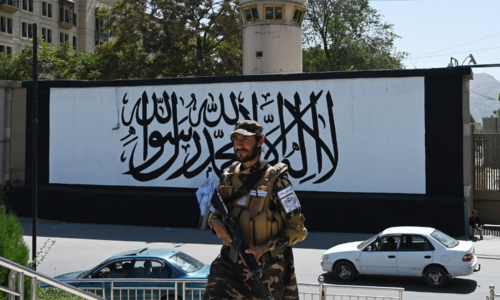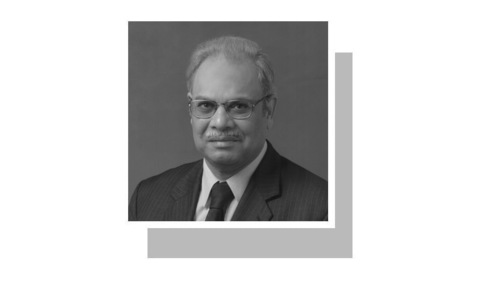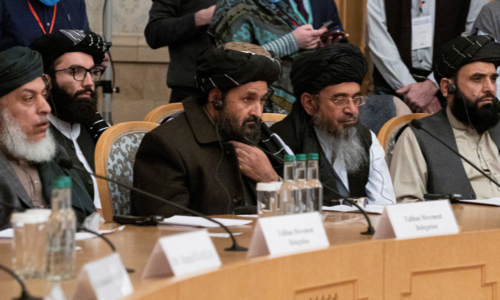THE Taliban are puppets of the Americans and the ‘Western crusader’ because they met CIA and US officials! There can’t be a wackier, stupider claim but this one led to the Islamic State Khorasan (IS-K) sending a young heaven-seeker who blew himself up at Kabul airport on Aug 27, killing up to 170 including 13 American soldiers and, according to one Taliban official (later denied), 28 members of the Taliban militia coordinating the evacuation.
Extremists targeting extremists; the irony should not be lost. Even if IS-K excels in suicide attacks on large gatherings of Afghan civilians, the Taliban have done their share too. Both have spread fear through beheadings and limb chopping, forced girls into marrying their fighters, and looted ordinary people. One might have expected a close alliance since both have fought America. But, in fact, they are bitter foes.
What splits IS-K from Taliban is ideology; they differ on what a true Islamic state is. To achieve its supreme goal, each considers no sacrifice to be too great. All militant groups strewn across Afghanistan — Al Qaeda, TTP, IMU (Uzbek), and ETIM (Uighur) — dream their respective sectarian dreams.
Even if targeted by extremists of other brands, Taliban need to abandon their earlier extremism.
An offshoot of the Islamic State group, IS-K seeks a Sharia-based political system via a worldwide caliphate. Inspiration comes from the writings of Sayyid Qutb, an Egyptian student who was radicalised while studying in America during the 1950s and was hanged by Nasser in 1966. IS’s first ‘caliph’, Abu Bakr al-Baghdadi, committed suicide after being cornered by US forces in Syria. Taliban rulers vow they will eliminate the hyper-violent IS-K; poachers have become gamekeepers.
In contrast, the Taliban’s Islamic Emirate demands Sharia without caliphate. When Mullah Omar proclaimed himself to be amir-ul-momineen (leader of the faithful, a title first held by caliph Hazrat Umar), he probably meant this for Afghans only. Nothing is known presently of what the just-announced Afghan government wants. There is no provisional constitution — nothing about how Hibatullah’s Afghanistan differs from Ghani’s Afghanistan. That the Taliban are both extreme and visionless is obvious.
This doesn’t surprise. In 2016 researchers at the Centre for International Cooperation at New York University wanted to explore the Taliban mindset. What would they do after winning? This drew a blank. After interviewing members of the Taliban’s political commission, both directly and indirectly through intermediaries, they concluded, “the movement is too disparate and fragmented (both horizontally and vertically) for there to be any unity of thought beyond foundational issues like the presence of foreign troops”.
Educated in the jihad-focused, intellectually barren Pakistani madressahs like Akora Khattak or Jamia Binoria, Taliban leaders demonstrate no knowledge of Islamic history or matters of Islamic governance such as in the classic works of Al Mawardi and Ibn-i-Khaldun. This cabal of unelected mullah warriors is also clueless of what makes the modern world work. Yet they are in charge of running supply chains, airports, cellphone systems, hospitals, electricity, water supply, etc.
The ISI chief’s three-day advice-laden Kabul visit was probably to remind the new rulers of the debt they owe to Rawalpindi. But a second, more important, purpose might have been to give tips for preventing economic collapse. While Afghanistan has huge mineral wealth, China gives cash only on delivery — not promises. Hence the Taliban government will need the US-backed IMF and World Bank even more than Pakistan. Because Afghanistan imports everything and produces next to nothing it has few options.
But shedding extremism and seeking the West’s help will lay the Taliban wide open to charges of betrayal from Al Qaeda, among others. Would Osama bin Laden (‘shaheed Osama’, in PM Khan’s words) have endorsed it? Tribal societies take betrayal seriously, very seriously. The Taliban leadership knows (and dreads) what happened in Pakistan. Any perceived shift towards some kind of “enlightened moderation” will surely anger Islamist groups.
Recall: although a formal alignment with the United States after 9/11 brought rich bounties to Pakistan’s civil and military establishment, this infuriated religious radicals. The TTP was the angriest. Its extremists accused Pakistan of double-dealing and targeted it with countless suicide bombings.
If the Taliban government insists on remaining an ideological force an unresolved question shall occur again and again. How is its concept of the ‘true’ Islamic state superior to that of other militants in Afghanistan? A thousand years has not resolved the crucial question of trueness.
Read: The Taliban challenge
This confusion will never end. While the Quran is explicit on matters of personal conduct and faith, it does not even mention ‘state’ (or Riyasat-i-Madina or Vilayat-i-Faqih). In fact, the very concept of a nation-state with fixed geographical boundaries came eight to nine centuries later in Europe. Many scholars have noted that the Arabic language had no word for state at the time of the Prophet (PBUH). How could it when no such thing then existed?
More confusion: who should head a state? Many Sunnis believe the Prophet did not specify his temporal successor or even suggest a procedure for determining one. This leads some Islamic scholars to infer that he saw the ummah forming a spiritual community only, not a political one. Claiming that the entire world belongs to Islam and Muslims are not restricted to manmade artificial national borders, Maulana Abul Ala Maudoodi had rejected the demand for Pakistan in his 1933 essays in Tarjuman-ul-Quran. The pragmatic maulana did, of course, change his mind later.
To avoid a grim future, Afghanistan must learn from Vietnam which also soundly defeated the mightiest of the mighty — and after a much bloodier fight. Compared to a quarter million Afghans, over two million Vietnamese perished. Less than 4,000 Americans died in Afghanistan but over 50,000 in Vietnam. Today, however, Vietnam is no longer an impoverished, war-devastated peasant society. Instead, it bustles with life and energy, boasting one of the highest economic growth rates in the world.
Vietnam, like China, is officially communist but after winning the war it dumped its old ideology in favour of nation-building. Rather than gloat at being the graveyard of some grand empire, Vietnam chose to live and thrive. Shedding extremist baggage and becoming a normal, non-ideological state is surely the way forward for Afghanistan.
The writer is an Islamabad-based physicist and writer.
Published in Dawn, September 11th, 2021














































